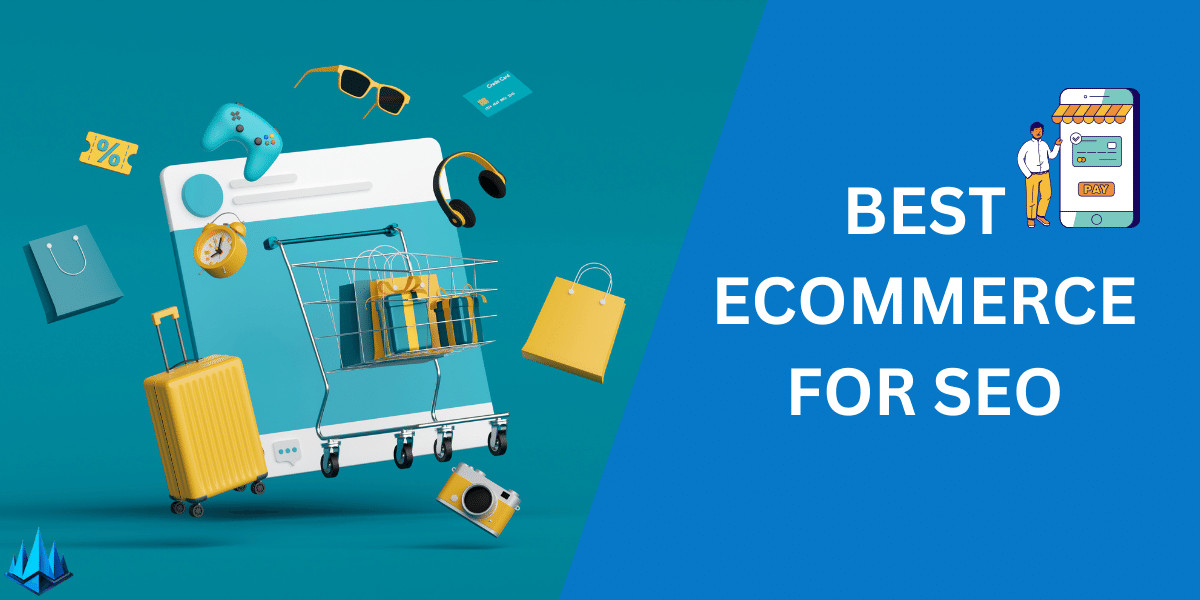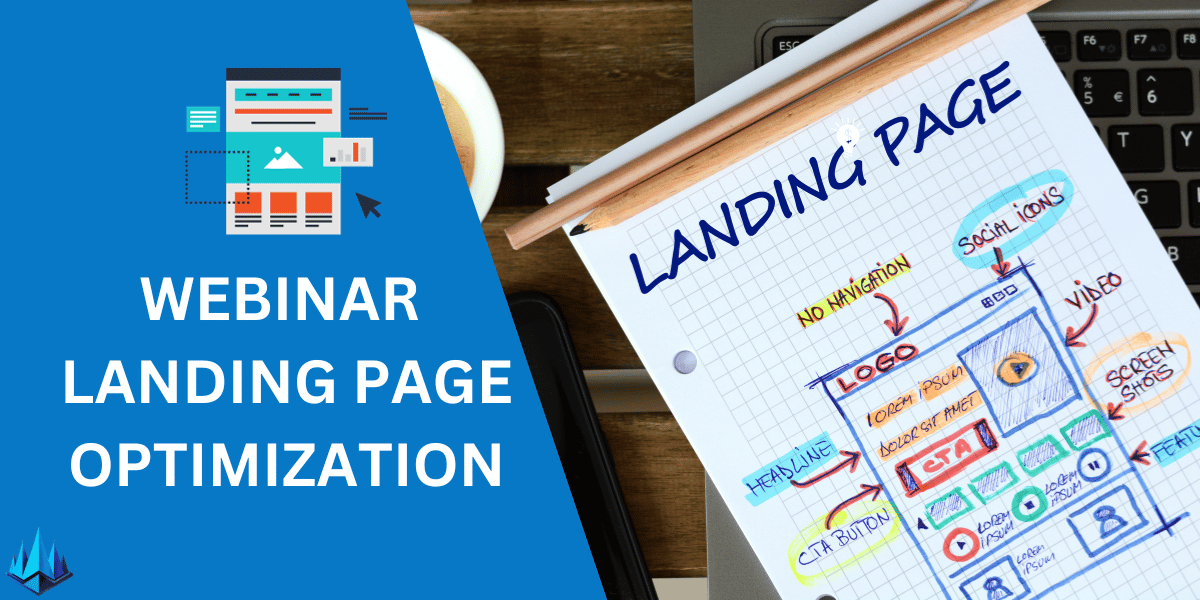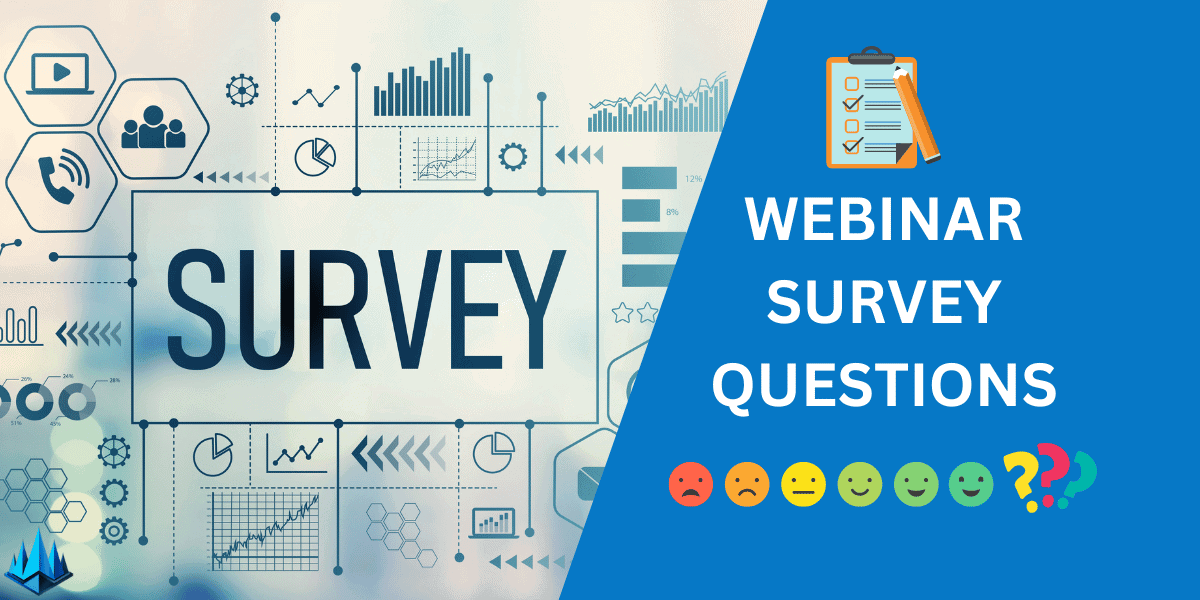Imagine a world where your online store isn’t just a drop in the ocean of e-commerce, but a shining lighthouse attracting swarms of eager buyers. That’s the power of mastering SEO with the right platform. In the fast-paced digital marketplace of 2024, picking the best ecommerce for SEO isn’t just a smart move; it’s a survival tactic for your business. Ready to transform your online store into a magnet for traffic and sales? Stay tuned, because we’re diving into the ultimate toolkit for ecommerce success in the SEO arena.
TL;DR:
TL;DR:
- Discover the 11 best ecommerce platforms for SEO in 2024.
- Learn how to turn your store into a traffic magnet.
- Get insights into making your e-commerce site SEO-supercharged.
- Realize your online store’s full potential with the right platform.
What Are the Best Ecommerce for SEO Platforms?
1. Shopify
Shopify is like your friendly neighborhood superhero for e-commerce. It’s user-friendly, versatile, and perfect for startups. Whether you’re selling handmade crafts or launching a tech gadget, Shopify adapts to your needs. It’s the go-to platform for many because it makes setting up an online store a breeze.

Key Benefits
- Ease of Use: Intuitive design and user-friendly interface.
- Customization: Wide range of customizable templates.
- App Integrations: Extensive app store for added functionalities.
- 24/7 Support: Round-the-clock assistance for any issues.
- Scalability: Grows with your business, handling increased traffic and sales effortlessly.
Pricing
- Basic Plan: $25/month (includes all the essentials for a new business).
- Shopify Plan: $65/month (ideal for growing businesses with more staff).
- Advanced Plan: $399/month (best for scaling businesses with advanced reporting).
- Free Trial: Yes, a 14-day free trial to test the waters.
- Additional Costs: Extra fees for certain apps or premium themes.
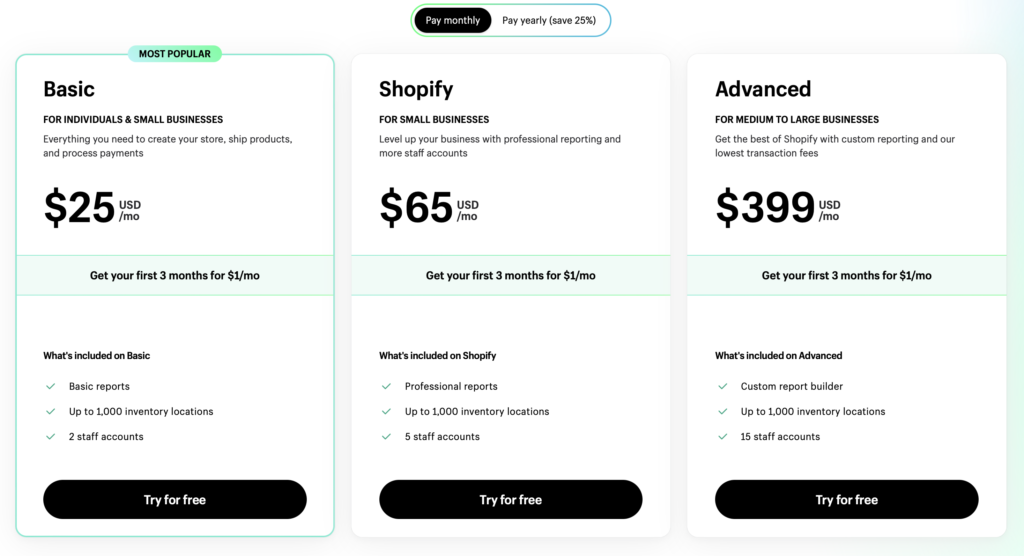
Pros & Cons
Pros:
- Flexibility: Perfect for businesses of all sizes.
- App Store: The app store is like an Aladdin’s cave of features.
- Customer Support: Like having a wise guru always ready to help.
Cons:
- Cost: Can be pricey once you start adding apps and premium features.
- Customization: Requires some learning if you’re diving into deeper customizations.
2. WooCommerce
WooCommerce is like the Swiss Army knife of e-commerce platforms. It’s a free WordPress plugin that turns your website into a fully functional online store. If you’re already a fan of WordPress, it’s like finding the missing puzzle piece for your e-commerce needs. It’s super customizable, making it a favorite for those who love to tinker and tailor their online presence.
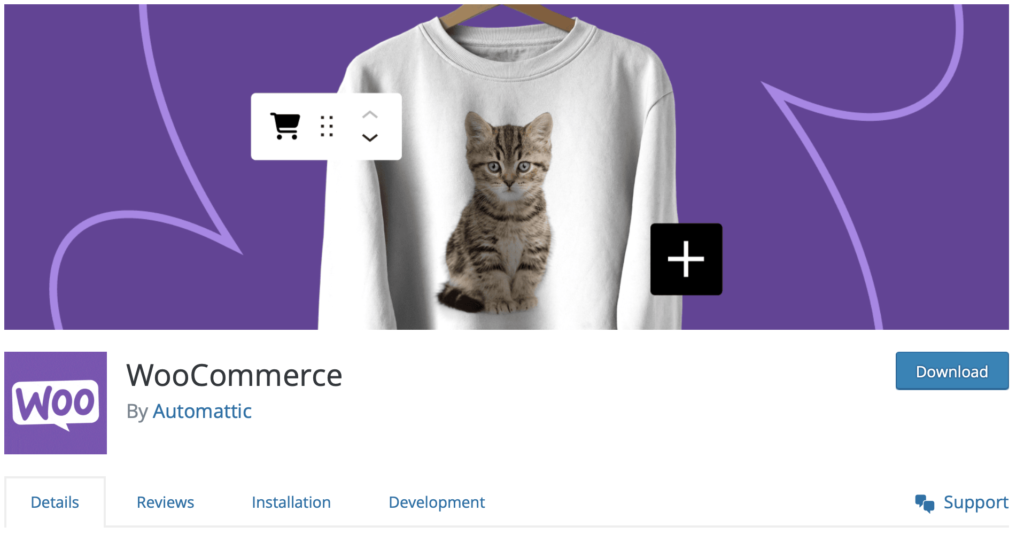
Key Benefits
- WordPress Integration: Seamlessly integrates with your existing WordPress site.
- Customization: Endless customization options with plugins and themes.
- Open Source: Modify and adapt the code to your heart’s content.
- Community Support: A vast community for help and advice.
- SEO Friendly: Leverages WordPress’s superior SEO capabilities.
Pricing
- Core Plugin: Free (powerful enough for most startups).
- Extensions: Prices vary (for additional features like bookings, memberships, etc.).
- Themes: Both free and paid options are available.
- Hosting: Costs vary depending on your choice of web host.
Pros & Cons
Pros:
- Flexibility: It’s like having an e-commerce chameleon.
- Cost-effective: Starting with the core plugin is free.
- SEO Edge: Riding on WordPress’s SEO prowess is a huge plus.
Cons:
- Complexity: Can be overwhelming if you’re not familiar with WordPress.
- Maintenance: Like having a garden, it needs regular care (updates and security).
- Hosting Costs: Since it’s self-hosted, additional costs must be considered.
3. BigCommerce
Think of BigCommerce as the all-in-one toolkit for online retail. It’s a cloud-based e-commerce platform designed for those who want to grow big and fast. With BigCommerce, you get many built-in features, tools, and analytics. It’s like having a super-efficient assistant who’s excellent at multi-tasking, helping you manage and scale your business seamlessly.
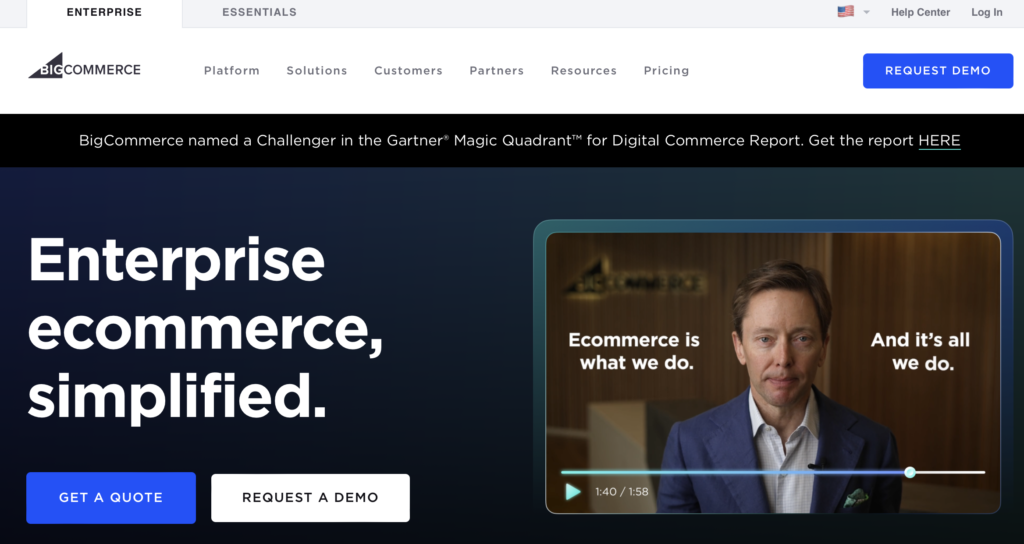
Key Benefits
- Built-in Features: Packed with features right out of the box.
- Scalability: Great for growing businesses aiming high.
- SEO Performance: Strong SEO tools to boost your online visibility.
- Multi-channel Selling: Sell across platforms like Facebook, Instagram, and Amazon.
- Security: Robust security features for peace of mind.
Pricing
- Standard Plan: $39.95/month (great for startups).
- Plus Plan: $105/month (for growing businesses with more complex needs).
- Pro Plan: $399/month (for scaling to new heights).
- Free Trial: Yes, a 15-day free trial is available.
- No Additional Transaction Fees: Keep more of your earnings.
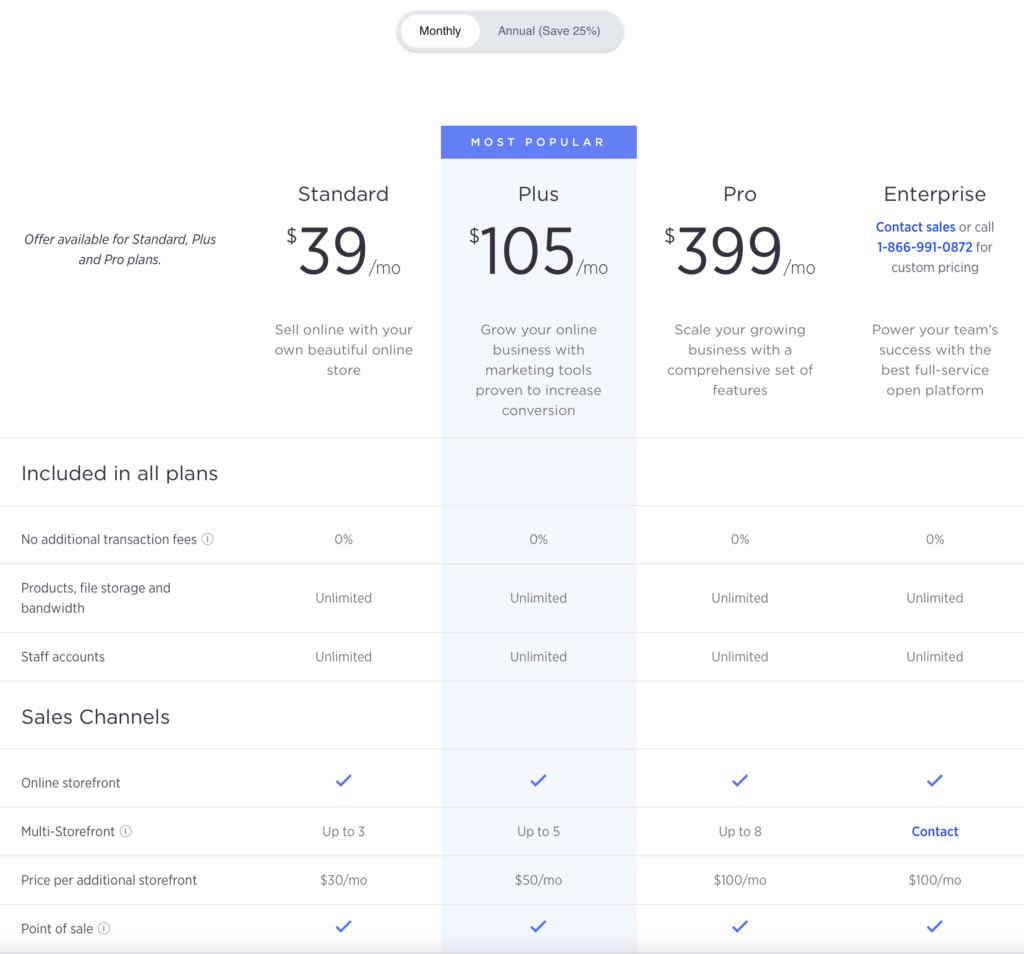
Pros & Cons
Pros:
- Features Galore: It’s like a Swiss Army knife, packed with everything you need.
- No Transaction Fees: More money in your pocket.
- Scalability: Like a good pair of jeans, it fits even as you grow.
Cons:
- Learning Curve: Might feel like a steep hike for beginners.
- Theme Customization: Limited free themes, so you might need to spend extra.
- Pricing: Can get pricey as you climb the ladder.
4. Adobe Commerce (Magento)
Adobe Commerce (Magento) is like the architect of e-commerce platforms – powerful, sophisticated, and flexible. It’s a favorite among large enterprises and tech-savvy web developers. Magento offers an open-source solution, Magento Open Source, and a premium, hosted solution, Magento Commerce. It’s like having two different engines, depending on how much horsepower you need.

Key Benefits
- Customization: Highly customizable for a unique store.
- Scalability: Ideal for large-scale businesses.
- Robust Community: A strong community of developers and users.
- Extensive Features: Comprehensive set of out-of-the-box features.
- Multi-store Management: Manage multiple stores from one dashboard.
Pricing
- Magento Open Source: Free to download and use.
- Magento Commerce: Custom pricing based on business size and requirements.
- Hosting: Self-hosting costs vary.
- Extensions: Prices vary for additional features and integrations.
- Free Trial: Not typically offered, but demos are available.
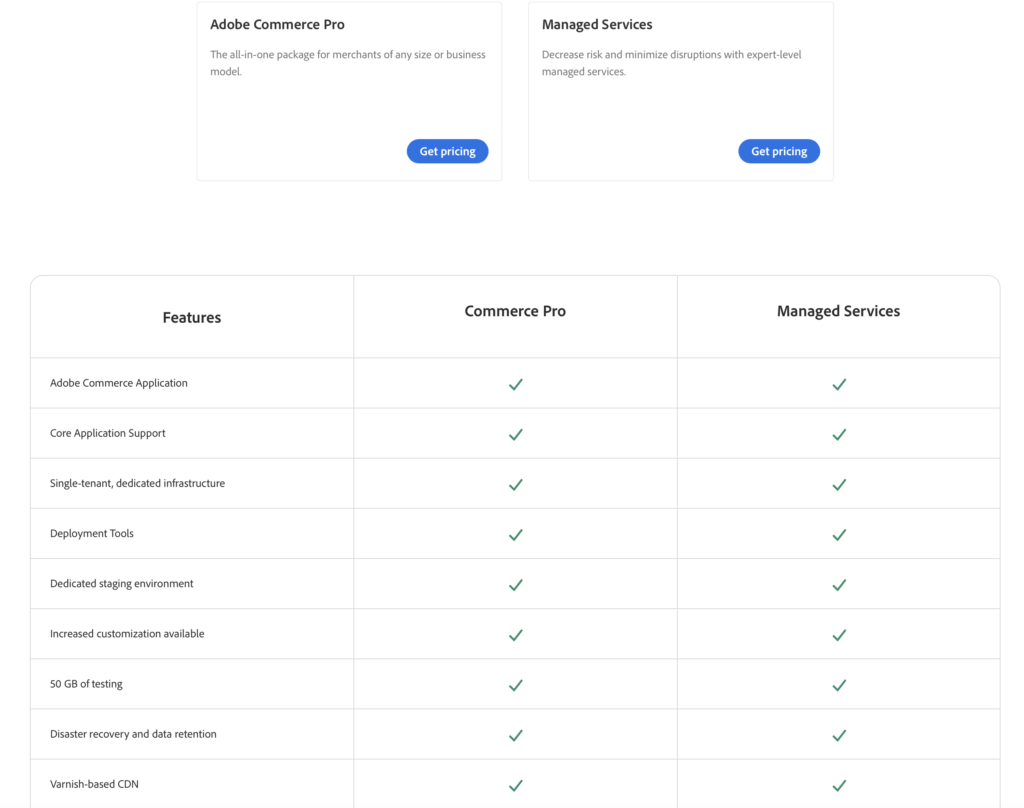
Pros & Cons
Pros:
- Flexibility: It’s like having a tailor-made suit that fits all your business needs.
- Community Support: Like having a wise council of Magento experts.
- Feature-Rich: Packed with features, ready to tackle any challenge.
Cons:
- Complexity: It’s like learning a new language – not for the faint-hearted.
- Cost: The high level of sophistication comes with a price tag.
- Resource-Intensive: Needs robust hosting, which can add up in costs.
5. Squarespace
Squarespace is like the stylish, easy-to-use notebook of e-commerce platforms. It’s perfect for creatives and small business owners who want a beautiful, minimalist website with minimal fuss. Squarespace is known for its sleek templates and user-friendly interface, making it a great choice for those who prioritize design and simplicity.
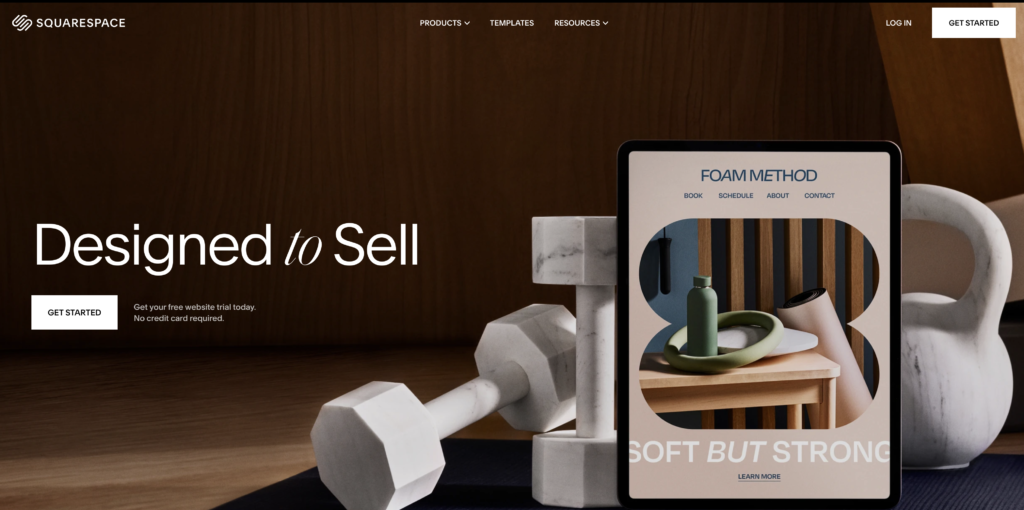
Key Benefits
- Stunning Design Templates: Beautiful, award-winning design options.
- Ease of Use: Very user-friendly, ideal for beginners.
- All-in-One Solution: Includes hosting, domains, and e-commerce in one package.
- Built-in SEO Tools: Helps your site get found on search engines.
- Responsive Design: Looks great on both desktop and mobile.
Pricing
- Personal Plan: $23/month (basic features, no e-commerce).
- Business Plan: $33/month (e-commerce functionality with a 3% transaction fee).
- Basic Commerce: $36/month (no transaction fees, advanced e-commerce features).
- Advanced Commerce: $65/month (advanced marketing and commerce insights).
- Free Trial: Yes, a 14-day free trial to experiment with.
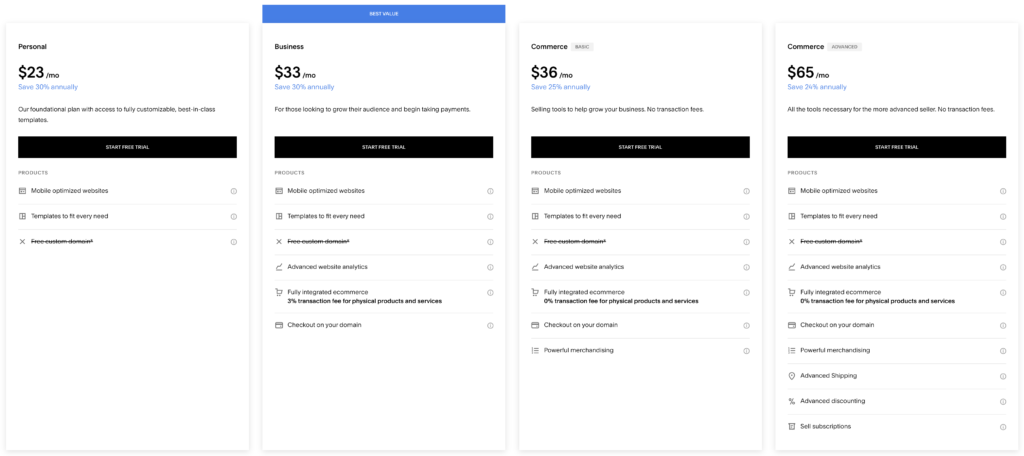
Pros & Cons
Pros:
- Design-Focused: It’s like having a fashion-forward friend – always looks great.
- Ease of Use: As simple as making a cup of tea.
- All-in-One Package: Hosting, domain, and website in one neat bundle.
Cons:
- Customization Limits: Like a fixed-menu restaurant, fewer options to go off-script.
- E-commerce Features: Not as extensive as dedicated platforms.
- Pricing: Can be a bit pricey considering the e-commerce limitations.
6. Wix eCommerce
Wix eCommerce is like the friendly neighborhood coffee shop of online store builders – warm, inviting, and perfect for small businesses. It’s a breeze to use, offering a drag-and-drop builder that lets you whip up a website without needing to code. Ideal for startups and entrepreneurs, Wix eCommerce provides a simple yet effective platform to launch your online presence.
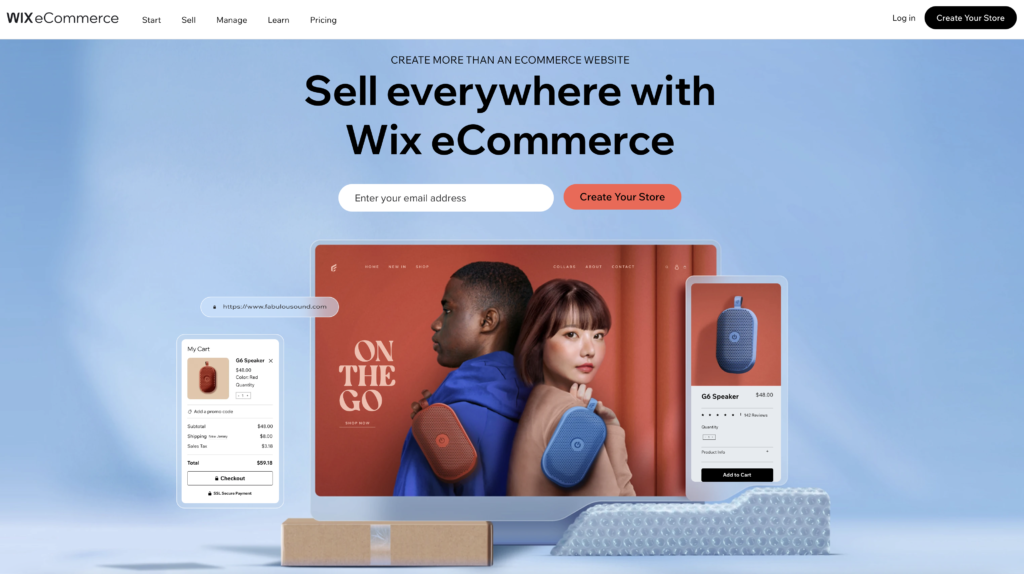
Key Benefits
- Drag-and-Drop Builder: Create a website with ease, no coding required.
- Beautiful Templates: Wide range of stylish, customizable templates.
- Mobile Optimization: Your store looks great on any device.
- Marketing Tools: Integrated tools to help promote your business.
- App Market: Enhance your site with a variety of apps.
Pricing
- Business Basic: $17/month (for starting your online business).
- Business Unlimited: $25/month (for growing your business).
- Business VIP: $35/month (for all the premium features).
- Free Version: Available, but without e-commerce features.
- Free Trial: 14-day free trial for all premium plans.
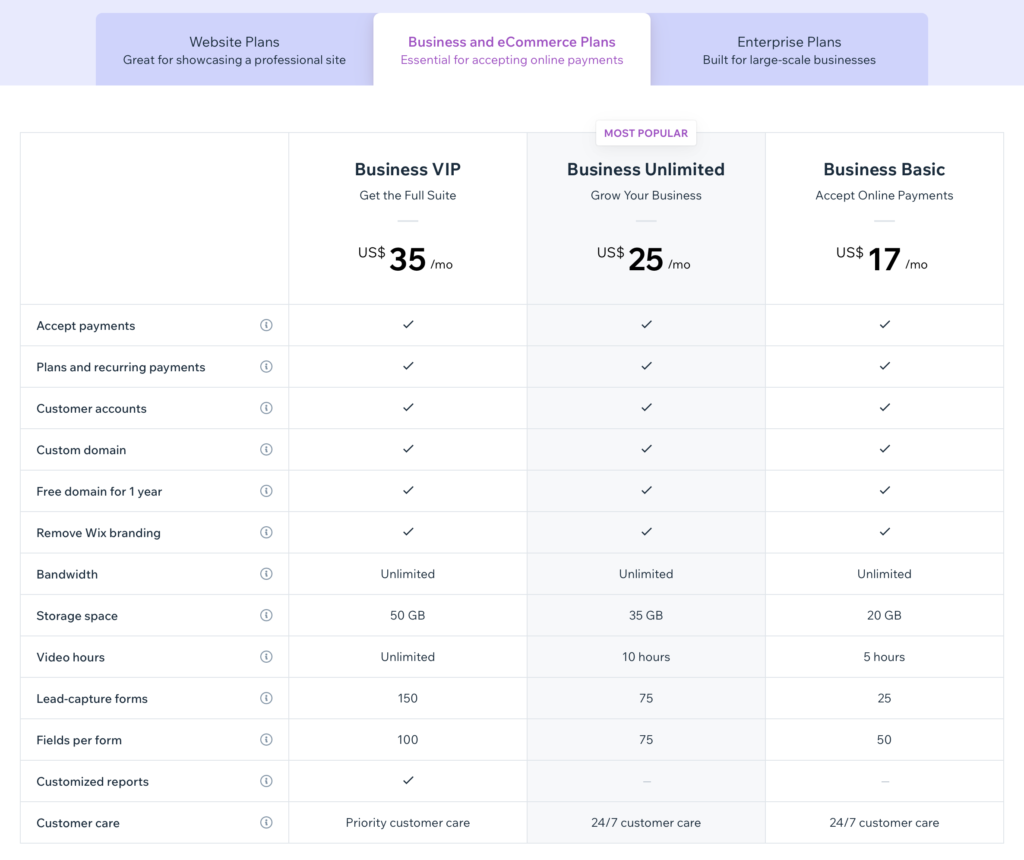
Pros & Cons
Pros:
- User-Friendly: It’s like riding a bike – easy and fun.
- Design Flexibility: Like having a digital canvas to paint your dream store.
- Marketing Tools: Handy tools to get your brand out there.
Cons:
- Scalability: More like a cozy cafe than a large restaurant, not ideal for very large stores.
- Customization Limits: Sometimes feels like you’re working with training wheels.
- SEO Limitations: Not the strongest in terms of SEO capabilities.
7. Weebly
Weebly is like the friendly, approachable neighbor in the e-commerce platform neighborhood. It’s a fantastic option for small businesses or individuals just dipping their toes into online retail. Known for its simplicity and ease of use, Weebly offers a straightforward way to build an online store without getting bogged down in technical details.

Key Benefits
- User-Friendly Interface: Intuitive drag-and-drop builder.
- Affordable Pricing: Great for budget-conscious startups.
- SEO Tools: Basic tools to help your store rank in search engines.
- Mobile Optimization: Ensures your site looks good on all devices.
- Integrated Shopping Cart: Easy to set up and manage.
Pricing
- Free Plan: Basic features with Weebly branding.
- Personal Plan: $10/month (when paid annually, connect a custom domain).
- Professional Plan: $12/month (when paid annually, for small businesses and groups).
- Performance Plan: $26/month (when paid annually, for businesses needing advanced features).
- Free Trial: 30-day free trial for paid plans.
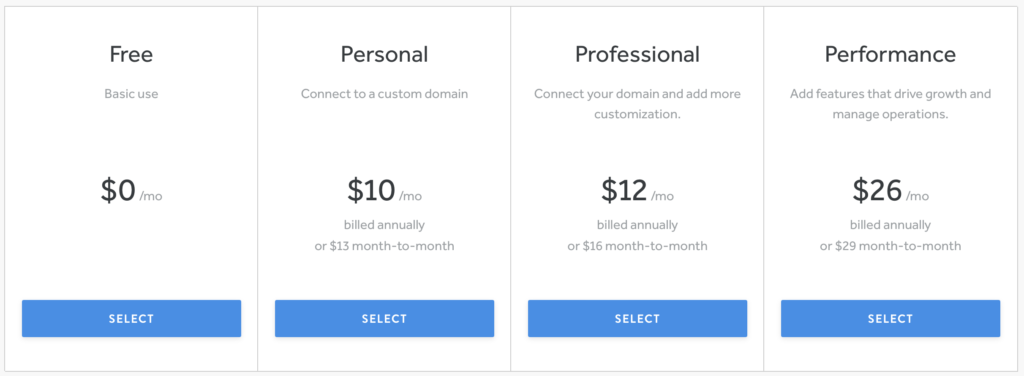
Pros & Cons
Pros:
- Simplicity: It’s like baking a cake with a ready-made mix – quick and easy.
- Cost-Effective: Great for those watching their budget.
- Decent Range of Features: Like having a good toolset for basic DIY projects.
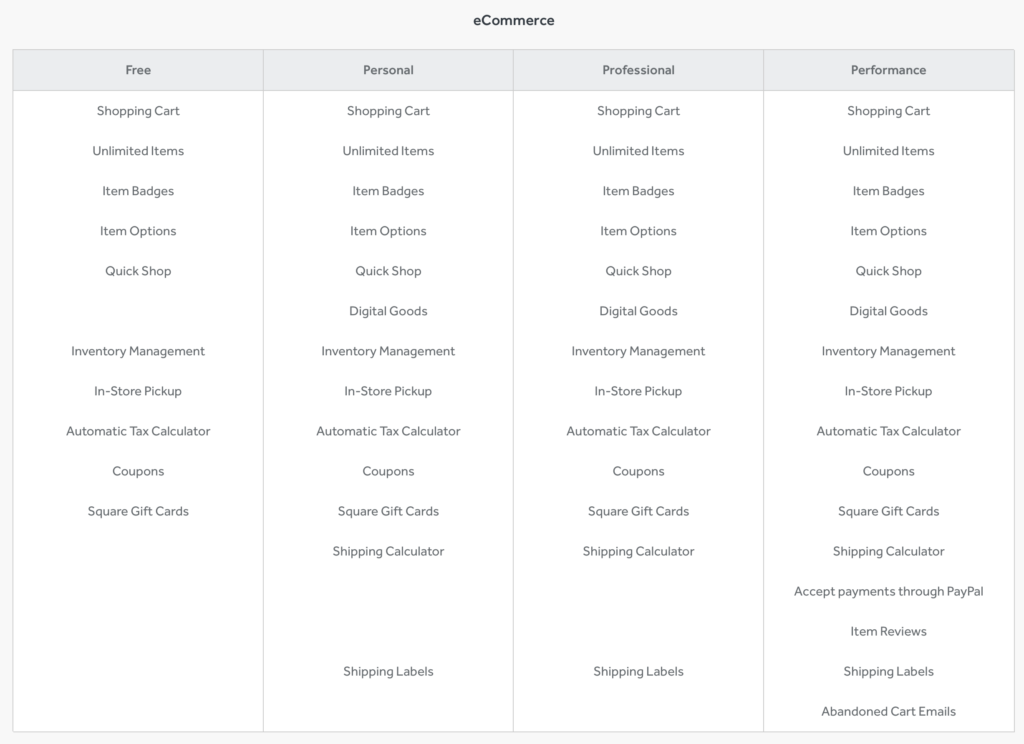
Cons:
- Limited Customization: It’s a bit like painting by numbers – not much room for creativity.
- Scaling Limitations: More suitable for small stores than rapidly growing businesses.
- E-commerce Features: Not as comprehensive as some other platforms.
8. 3dcart
3dcart is like the Swiss army knife for the e-commerce world. It’s a robust, feature-rich platform that caters to businesses of all sizes, making it ideal for startups looking to scale. With 3dcart, you’re not just building an online store; you’re setting up a fully integrated e-commerce ecosystem.
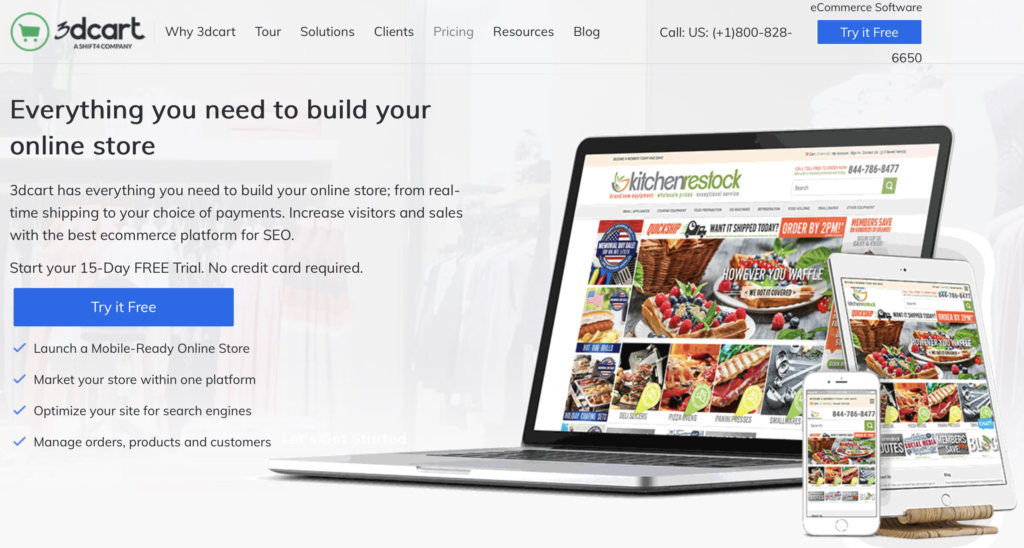
Key Benefits
- Comprehensive Features: Includes everything from inventory management to SEO tools.
- Customization Options: Extensive customization capabilities to match your brand.
- Built-in SEO Tools: Optimized for better search engine visibility.
- Variety of Payment Gateways: Supports a wide range of payment options.
- Mobile-Friendly: Ensures a seamless shopping experience on all devices.
Pricing
- Startup Store: $19/month (for small startups).
- Basic Store: $29/month (for growing businesses).
- Plus Store: $79/month (for expanding businesses with more products).
- Power Store: $229/month (for large-scale online stores).
- Free Trial: Yes, a 15-day free trial is available.
- No Transaction Fees: More profit for your business.
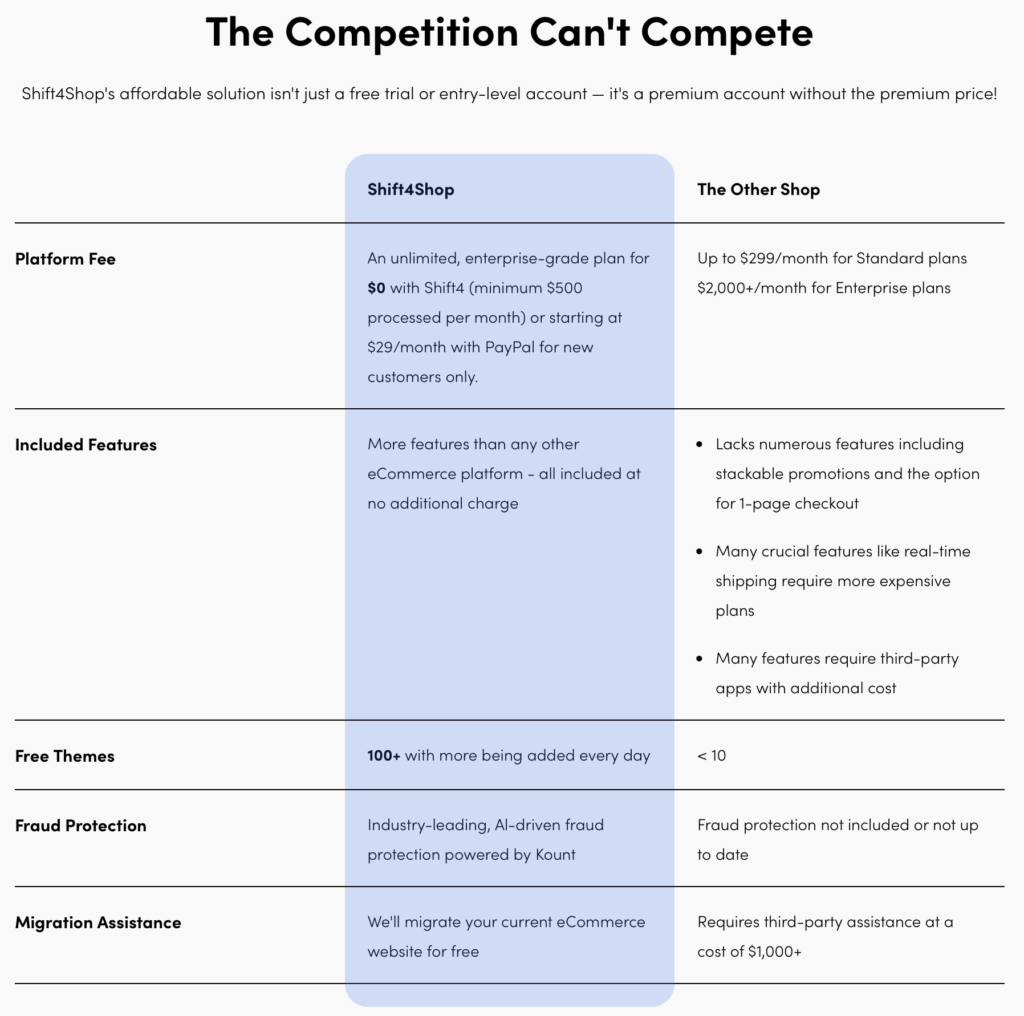
Pros & Cons
Pros:
- Feature-Rich: Like having a toolbox with every tool you might need.
- SEO Optimization: Great for boosting your store’s online visibility.
- Customizability: Tailor your store to fit your brand precisely.
Cons:
- Learning Curve: Might feel overwhelming at first, like learning to drive a manual car.
- Template Design: Limited free themes compared to some competitors.
- Support Quality: Can vary, sometimes like finding a needle in a haystack.
9. PrestaShop
PrestaShop is like the crafty DIYer in the e-commerce platform world. It’s an open-source solution, meaning it’s free to download and modify, offering a high degree of customization. Ideal for those who have a bit of technical know-how, PrestaShop allows you to build a highly personalized online store that can grow and change with your business.

Key Benefits
- Open-Source: Completely free to download and use.
- Customizable: Tailor every aspect of your store.
- Community Support: Strong community for help and tips.
- International Selling: Supports multiple languages and currencies.
- Feature-Rich: Wide range of built-in features and add-ons.
Pricing
- Core Software: Free to download.
- Add-ons and Themes: Prices vary (free and paid options available).
- Hosting Costs: Depends on your choice of hosting provider.
- No Free Trial: As it’s open-source, you can try it out for free anytime.
- Additional Costs: For premium add-ons, custom development, or professional support.
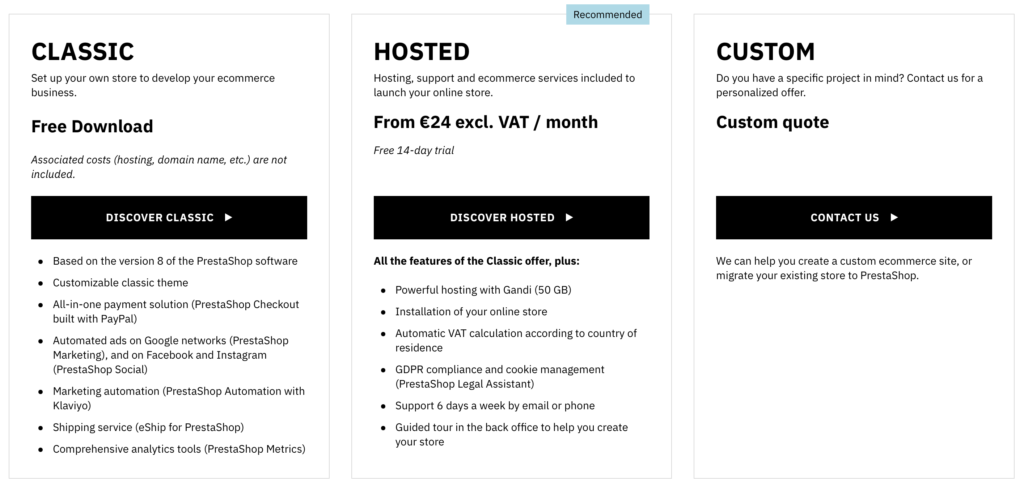
Pros & Cons
Pros:
- Flexibility: It’s like having a custom-built car – tailored just for you.
- Cost-Efficient: Great for those on a tight budget.
- Community Driven: Like having a neighborhood watch for your online store.
Cons:
- Technical Know-How Required: Not for the tech-shy; it’s like assembling furniture with an extra set of screws left over.
- Time-Consuming: Customization can be a lengthy process.
- Support: Being open-source, dedicated support is limited.
10. OpenCart
OpenCart is like the handy toolkit in the e-commerce world – open-source, straightforward, and practical. It’s a great choice for those who want a no-frills, functional online store. Think of it as a blank canvas; it’s basic but can be transformed into something special with the right tools and skills.
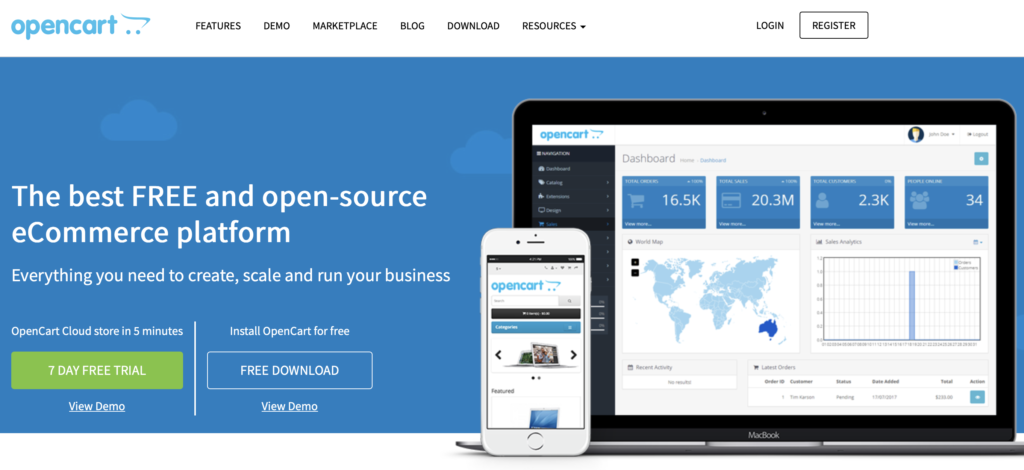
Key Benefits
- Open-Source: Free to download and modify.
- User-Friendly: Intuitive dashboard, easy to manage.
- Extensions: Wide range of add-ons for enhanced functionality.
- Multi-Store Functionality: Manage multiple stores from one admin panel.
- Community Support: Active community for advice and tips.
Pricing
- Bronze Plan: $59/month suitable for small businesses.
- Silver Plan: $99/month with more processing power.
- Gold Plan: $199/month, suitable for enterprise.
- Extensions and Themes: Various prices (both free and paid options available).
- Hosting Costs: Depends on your chosen hosting provider.
- No Free Trial: Open-source, so you can experiment without cost.
- Additional Costs May arise for premium extensions, themes, or professional support.
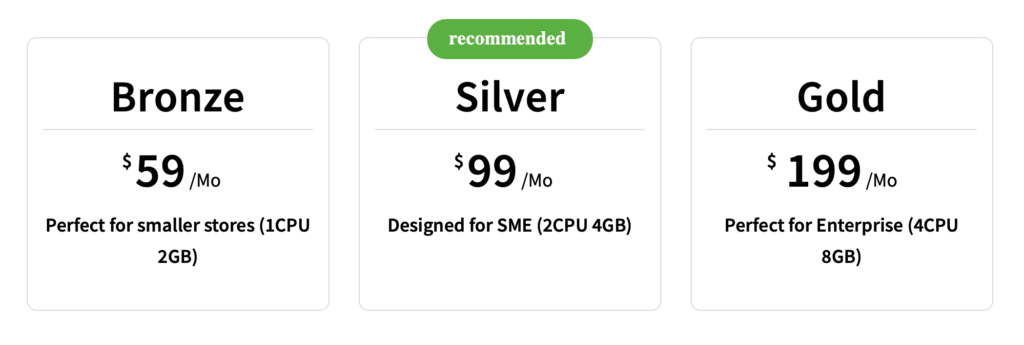
Pros & Cons
Pros:
- Cost-Effective: Ideal for budget-conscious startups.
- Customizability: Like having a set of building blocks, make it what you want.
- Community-Driven: There’s a sense of camaraderie among users.
Cons:
- Technical Skills Needed: It’s like building a model airplane – some assembly is required.
- Design Limitations: Basic templates mean you might need to invest in design.
- Support: Being open-source, direct support is limited.
11. Zyro
Zyro is like the new kid on the block in the e-commerce platform neighborhood – fresh, modern, and full of potential. It’s designed for those who want to create a sleek online store quickly and without hassle. Think of Zyro as your friendly assistant, simplifying the process of building a website with its user-friendly tools and clean designs.
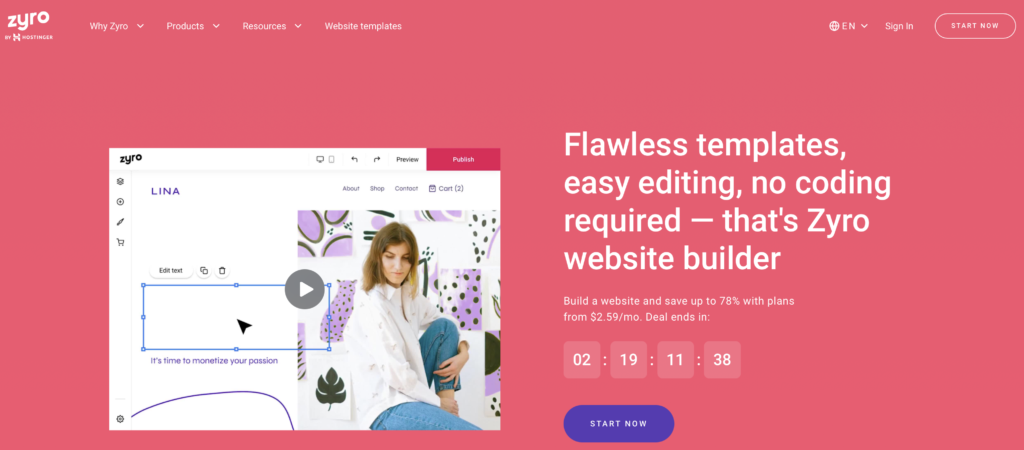
Key Benefits
- Ease of Use: Extremely user-friendly, great for beginners.
- AI Tools: Innovative AI tools for design and content.
- Responsive Design Templates: Modern and fully responsive templates.
- Speed and Security: Fast loading times and robust security features.
- Integrations: Easy integration with various business tools.
Pricing
- Website Plan: $2.90/month (basic website features, no e-commerce).
- Business Plan: $4.90/month (for small businesses, includes e-commerce features).
- Advanced Store Plan: $15.90/month (for advanced e-commerce needs).
- Free Trial: No free trial, but offers a 30-day money-back guarantee.
- No Additional Transaction Fees: Keeps costs predictable.
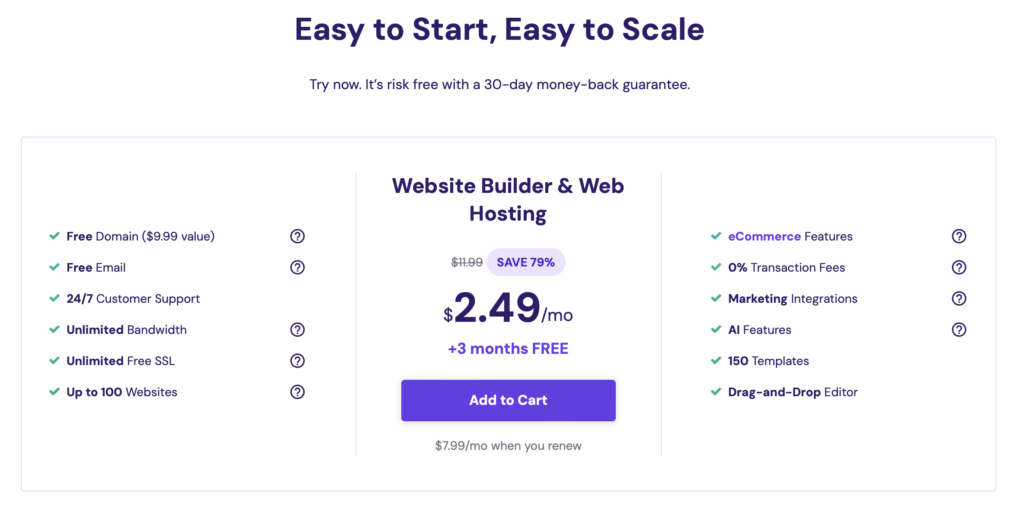
Pros & Cons
Pros:
- Simple to Use: It’s like having a straightforward recipe – easy to follow.
- Affordable: Great for startups watching their budget.
- AI Assistance: Like having a smart assistant for design and content.
Cons:
- Limited Customization: Only comes with Hostinger Hosting. Can feel a bit like painting by numbers.
- Newer Platform: Lacks the maturity and extensive features of established platforms.
- E-commerce Features: More basic compared to specialized e-commerce platforms.
Why SEO Matters for E-Commerce?
In the bustling digital marketplace, SEO is the compass that guides customers to your e-commerce store. It’s not just about being online; it’s about being found. With millions of online shops vying for attention, a strong SEO strategy is what makes you visible in the vast ocean of the internet. Think of SEO as the secret sauce that boosts your store’s rank in search results, driving more traffic, and converting clicks into customers.
Good SEO practices ensure that when someone searches for a product you sell, your store pops up, like a friend waving in a crowded room. It’s not just about being there; it’s about being noticed, and in the world of e-commerce, visibility is currency.

How Does Organic Traffic Benefit You?
Organic traffic, the kind that comes to your site naturally through search engines, is like the backbone of your online presence. It’s the steady stream of visitors who find you not because of paid ads, but because you’re offering what they’re searching for. This kind of traffic is gold in the digital world, bringing in users who are already interested in your products or services.
Imagine having a store where the customers walking in are already thinking about buying what you sell. That’s what organic traffic does. It’s more likely to lead to conversions because these visitors aren’t just browsing; they’re searching with a purpose. And the best part? It’s cost-effective. Unlike paid advertising, organic traffic doesn’t strain your budget.
Understanding SERPs and Mobile Experience
Navigating the world of Search Engine Results Pages (SERPs) is crucial for e-commerce success. SERPs are where your online store battles for visibility. A high-ranking position means more clicks, more traffic, and more potential sales. In this digital era, a significant chunk of these battles takes place on mobile devices. The mobile experience is not just an add-on; it’s a cornerstone of your online strategy.
Enhancing your website for mobile users boosts your SERP rankings, as search engines prioritize sites that cater well to mobile users. It’s about providing a seamless, user-friendly experience, whether your customers are on a desktop or scrolling through their phones. This harmony between SERP optimization and mobile experience is a key ingredient in the recipe for online success.

Buyers Guide: How We Conducted Our Research
When diving into the ocean of options to find the best ecommerce platforms for SEO, we focused on several key factors:
- Pricing: We examined how much each platform costs, considering different tiers and plans to cater to various business sizes and budgets.
- Features: We delved into the unique selling points of each platform. What made each one stand out? Were there specific SEO tools that set them apart?
- Negatives: No platform is perfect. We looked at what each might be lacking, whether it be in customization options, scalability, or ease of use.
- Support or Refund Policies: It’s crucial to have good backup. We checked if they offer robust customer support, community forums, or a clear refund policy.
These factors combined gave us a comprehensive view, helping us pinpoint the best ecommerce SEO solutions for maximizing SEO effectiveness.
Wrapping Up
As we wrap up our journey through the best ecommerce platforms for SEO in 2024, remember that the right platform can revolutionize your online business. It’s about more than just selling products; it’s about being seen in a crowded digital marketplace. With our carefully researched guide, we’ve armed you with the knowledge to make an informed decision that aligns with your business needs and SEO goals.
Why listen to us? Because we understand that in the world of e-commerce, visibility is king, and SEO is your crown. Our research is tailored to help you ascend the throne of online success. So, go ahead, choose your platform wisely and watch your e-commerce store thrive in the ever-evolving digital landscape.
Frequently Asked Questions
What makes an ecommerce platform good for SEO?
An ecommerce platform that excels in SEO typically offers customizable URLs, easy integration with analytics tools, mobile responsiveness, fast loading speeds, and built-in SEO-friendly features like meta tags and sitemaps.
Can small businesses benefit from SEO-focused ecommerce platforms?
Absolutely! SEO helps level the playing field, allowing small businesses to compete with larger ones by improving their visibility in search engine results.
How important is mobile responsiveness for SEO in ecommerce?
It’s crucial. With a significant portion of online shopping done on mobile devices, search engines favor websites that are mobile-friendly. This means better rankings and more traffic.
Do I need technical skills to manage SEO on these platforms?
Not necessarily. Many top ecommerce platforms are designed with user-friendly SEO tools that require minimal technical knowledge. However, a basic understanding of SEO principles is beneficial.
How often should I update my SEO strategy on my ecommerce site?
SEO is an ongoing process. Regular updates are essential to adapt to search engine algorithm changes, market trends, and customer behavior. Regular audits and adjustments can keep your site competitive.

